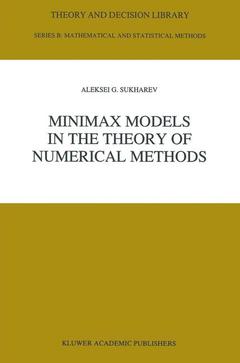Minimax Models in the Theory of Numerical Methods, Softcover reprint of the original 1st ed. 1992 Theory and Decision Library B Series, Vol. 21
Langue : Anglais
Auteur : Sukharev A.

In the Russian edition published in 1989, this book was called "Minimax Algorithms in Problems of Numerical Analysis". The new title is better related to the subject of the book and its style. The basis for every decision or inference concerning the ways to solve a given problem is the computa tion model. Thus, the computation model is the epicenter of any structure studied in the book. Algorithms are not constructed here, they are rather derived from computation models. Quality of an algorithm depends entirely on consistency of the model with the real-life problem. So, constructing a model is an art, deriving an algorithm is a science. We study only minimax or, in other words, worst-case computation models. However, one of the characteristic features of the book is a new approach to the notion of the worst-case conditions in dynamic processes. This approach leads to the concept of sequentially optimal algorithms, which play the central role in the book. In conclusion, I would like to express my gratitude to Prof. Dr. Heinz J. Skala and Dr. Sergei A. Orlovsky for encouraging translation of this book. I also greatly appreciate the highly professional job of Dr. Olga R. Chuyan who translated the book.
1. General Computation Model.- 1. Basic concepts.- 2. Functional classes under consideration.- 3. Classes of deterministic algorithms.- 4. Minimax concept of optimality and specific notions of optimality.- 5. Comparison of the best guaranteed results for adaptive and nonadaptive algorithms.- 6. Sequentially optimal algorithms.- 7. Stochastic algorithms.- 2. Numerical Integration.- 1. Optimal quadratures for functional classes determined by quasi-metrics.- 2. Optimal quadratures for functional classes determined by moduli of continuity.- 3. Sequentially optimal and one-step optimal integration algorithms.- 4. Numerical tests.- 5. Optimal computation of iterated integrals.- 6. Computation of multiple integrals using Peano type developments.- 3. Recovery of Functions from Their Values.- 1. Optimal nonadaptive algorithms.- 2. Sequentially optimal and one-step optimal recovery algorithms.- 3. Solution of a multistep antagonistic game related to the problem of optimal recovery.- 4. Search for the Global Extremum.- 1. On the choice of starting points for local optimization methods.- 2. Optimal nonadaptive search for a functional class determined by a quasi-metric.- 3. Reduction of the problem of constructing a sequentially optimal algorithm for a functional dass determined by a quasi-metric to aseries of problems of optimal covering.- 4. Specific computational algorithms.- 5. Case of approximate information.- 6. One-step optimal stochastic algorithm.- 5. Some Special Classes of Extremal Problems.- 1. Solution of equations and systems of equations.- 2. Maximization of a minimum function with coupled variables.- 3. Optimization with several criteria.- Author Index.
Date de parution : 10-2012
Ouvrage de 258 p.
16x24 cm
Mots-clés :
algorithms; efficiency; game theory; mathematics; operations research; optimization
© 2024 LAVOISIER S.A.S.



